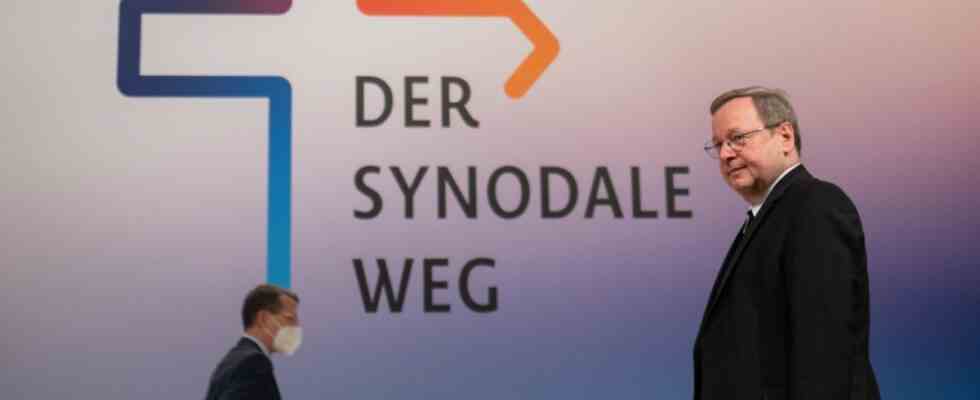Normally, nothing gets out when the German Catholic bishops meet every two months for their so-called permanent council in the Himmelpforten monastery near Würzburg. This time, however, there was an urgent need to speak. The reason was a new blue letter from Rome, which was again directed against the synodal path, the German reform debate between clergy and laity. This brings the dispute between Germany and the Vatican to a head shortly before the decisive and last synodal assembly in early March.
The senders of the letter are Cardinal Secretary of State Pietro Parolin, the second man in the Vatican after Pope Francis, and the Curial Cardinals Marc Ouellet (responsible for the clergy) and Luis Ladaria (responsible for the doctrine of the faith). In the letter, the three curials clearly reject so-called “synodal committees”. The synodal assembly decided on these bodies last September. In the future, bishops, church employees and lay people will regularly discuss important church issues with one another. In addition, a so-called permanent synodal council is to be prepared in the synodal committees. It sounds bureaucratic, but at its core it is about more participation by the people of God.
“You can’t do anything against the Pope.”
But co-determination is not well received in the center of power Rome: “Neither the synodal path nor an organ set up by it nor a national bishops’ conference” are authorized to set up such a body, according to the letter dated January 16. According to the warning from Rome, the council would “form a new leadership structure for the church in Germany that would place itself above the authority of the bishops’ conference and seem to actually replace it”.
The letter is a response to a complaint from Bavarian bishops and a cardinal from North Rhine-Westphalia in Rome. Apparently behind the back of Bätzing and the other confreres, Bishops Rudolf Voderholzer (Regensburg), Stefan Oster (Passau), Gregor Maria Hanke (Eichstätt), Bertram Meier (Augsburg) and Archbishop Rainer Maria Woelki (Cologne) asked the Holy See whether they really should participate in such committees.
The clarification from Rome leaves nothing to be desired in terms of clarity. The authors attach particular importance to the fact that Pope Francis is behind the content and has approved the letter “in forma specifica” – a technical term from canon law. Translated, this means “that the pope makes something his own, takes it into his own hands,” said canonist Norbert Lüdecke of the Catholic News Agency. “It is no longer an official act of the Curia, but one of the Pope. You can still appeal to the Pope against Curia decisions. Nothing works against the Pope.” During the regular visit of the German bishops to Rome, the curial cardinals had already tried to put the Germans in their place.
The lay people are not allowed to audition in Rome
Irrespective of this, Bishop Georg Bätzing, the chairman of the German Bishops’ Conference, continues to be resistant: The concern that a new body could undermine the authority of individual bishops is unfounded, said Bätzing. The synodal council will move within the applicable canon law. “The Holy See sees the danger of a weakening of the episcopal office – I experience synodal consultation as a positive strengthening of this office,” said Bätzing.
In any case, he was grateful that a large part of the bishops had confirmed their will to implement the decision of the synodal assembly and to continue to discuss synodal committees. He would be happy to discuss everything else in Rome, together with the lay people. They make up half of the synodal assembly and the presidium, but so far they have not been allowed to speak in Rome.
The President of the Central Committee of German Catholics (ZdK), Irme Stetter-Karp, said that if five bishops do not want to participate in synodal committees, this is to be regretted. “But the Catholic Church in Germany needs a future in which it can reposition itself after the abuse scandal. We need structural reforms and new ways of separating powers. We need more participation, a just church and a clear yes to diversity.”

